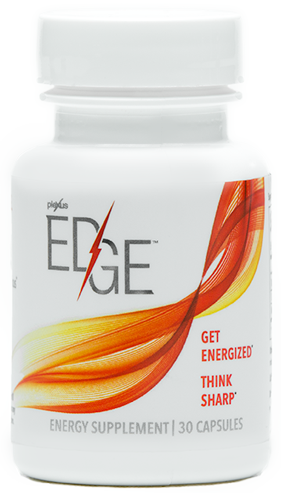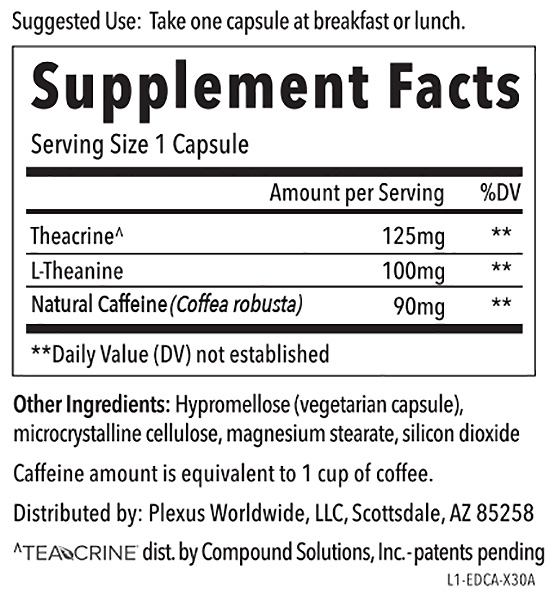
Edge from Plexus looks to be the answer to every individual's daily energy crisis. But is it worth the high price tag?
In case you weren’t aware the entire world is in an energy crisis!
Just take a look at the sales of energy drinks, fat burners, pre workout supplements, and even coffee! People are hungry for their energy and can never seem to get enough of the “high” that being on caffeine and other stimulants brings.
This has opened the floodgates in recent years to energy products that come in all shapes and sizes from bottles to powders and pills.
One of the newer energy pills trending on the market is Plexus Edge. Each serving contains about as much caffeine as a small 8oz cup of coffee, but there’s a couple other players to help sustain your energy.
Long story short
- This product's price is absolutely absurd
- Given the ingredients, it would be more fair at about $12 instead if only providing 30 capsules in a bottle
- The basic ingredient formula is okay if looking for light energy though
- There isn't much science in the way of actual fat burning here
Our biggest question, though, is whether or not it's worth it?? Given that we're seeing the price of $30 for 30 capsules (not 90 capsules), we're off to a bad start. Let's dig in...
Plexus Edge Ingredients
Plexus Edge is comprised of a concise formula of just three ingredients. Fortunately, all are fully disclosed so you are aware of just how many stimulants you’re putting in your body at a given moment.
Note: Dosages listed below are based on 1 capsule (i.e. 1 serving).
-
Theacrine (125mg)
Edge uses three ingredients commonly seen in pre workouts and fat burners. Interestingly enough, Theacrine is the highest dosed of them all.
Theacrine is an alkaloid found in certain plants, such as the Kucha plants, that is naturally synthesized from caffeine. It’s chemically similar to caffeine and possesses many of the same benefits, including increased locomotion[1].
The difference, however, is that theacrine doesn’t have a tolerance build up as is the case with caffeine.[2] We believe this is why Theacrine gaining quite the following around the industry. It behaves similarly to caffeine, but has significantly less tolerance issues, thereby eliminating the need to continually up the dose.
Theacrine also offers several other benefits such as: reducing oxidative stress in the body when used for at least seven consecutive days[3], and increasing dopamine levels in the brain, similar to caffeine.[4]
For even more information on Theacrine, check out our mega-post titled: Theacrine: Caffeine’s Long-Lasting Counterpart
-
L-Theanine (100mg)
Our next ingredient is beginning to show up in nearly every new pre workout and fat burner on the market. L-Theanine has gained quite the following in the industry as the “energy modulator”. Basically, L-theanine helps smooth out the harsh kick from high doses of caffeine and other stimulants and offsets any potential crash..
But there’s more. Theanine also enhances the cognitive focus effects of caffeine[5], and helps reduce fatigue, anxiety, and stress.[6,7]
Mike’s become a big fan of this when it’s included in pre workouts as it helps quell the energy beast that is caffeine. Typically we’ve noticed this best in a 1:2 ratio of caffeine to theanine, but here we have closer to a 1:1 ratio. Will this take too much out of the energy boost from caffeine? Only user reviews can tell.
-
Natural Caffeine (90mg)
Edge looks to "power" people through the day who chronically suffer from energy-depravation. The cure for that, is probably more sleep and exercise though!
Notice how we put the word natural in front of the caffeine? That’s not by accident. The caffeine in Plexus is derived from actual coffee beans (Coffea robusta). The big difference is that the majority of caffeine found in pre workout supplements, fat burners, and energy drinks is synthetic as opposed to natural caffeine.
Is there a big difference between the two?
Not really, there’s only some anecdotal accounts saying the synthetic (anhydrous) version of caffeine hits a little harder, but there’s been no conclusive evidence to prove that feeling one way or another.
More likely than not, this is marketed towards the more holistic crowd out there who feels better getting things from “natural” places instead of some kind of pill created in a lab. But if that’s really the case, why are they buying these energy pills in the first place? Wouldn’t it be easier to just grab some coffee and get caffeine in its most natural state?!
In the end, the amount of caffeine per capsule of Plexus Edge is about the same as you would get in your standard 6-8 oz cup of joe at the local diner.
Dosing
Take one capsule at breakfast or lunch.
The value question
Given the price, we had to dig deeper.
- Looking at this product, the raw materials should cost about $3.50.
- Depending on their distribution system, manufacturing, etc... the cost out the door to a retailer should be about $6.00 or so.
So how is this going for $30.00?!
Takeaway
In the end, there’s really nothing incredibly interesting or innovative about Plexus Edge. It’s an okay little formula, but WAYYYY overpriced for 30 capsules. Honestly, we'd expect 90 capsules for this price, or roughly $12-15 per bottle. With the price Plexus is charging, their profit margins must be downright absurd.
We never want companies to lose money, but we try to avoid companies that may be gouging their own customers or spending too much on sales/marketing - practices that we find that shameful.
Our message to Plexus is to literally drop the price 50%, or double the number of capsules, and we'll get on board. But we don't see how this is a fair purchase right now, and our readers deserve a deal.
To find an equally good option for energy, and a much better price, check out our Top Fat Burners page.
Either way, you'll get a lot more capsules for the price with that or any other product on our Best Fat Burners page linked above.





Comments and Discussion (Powered by the PricePlow Forum)